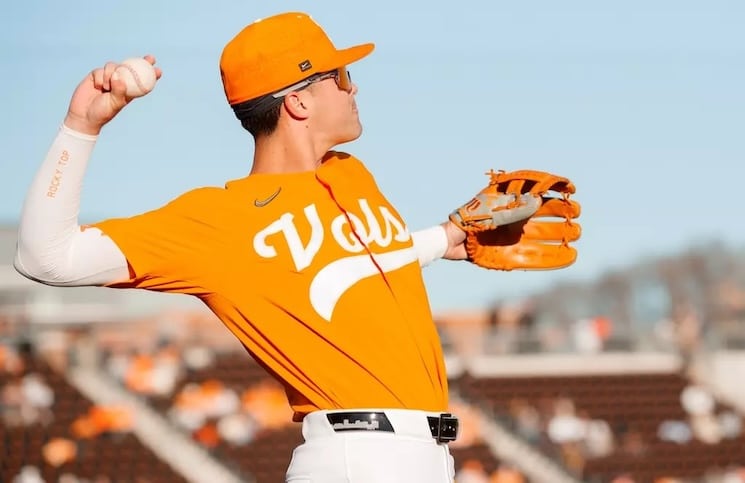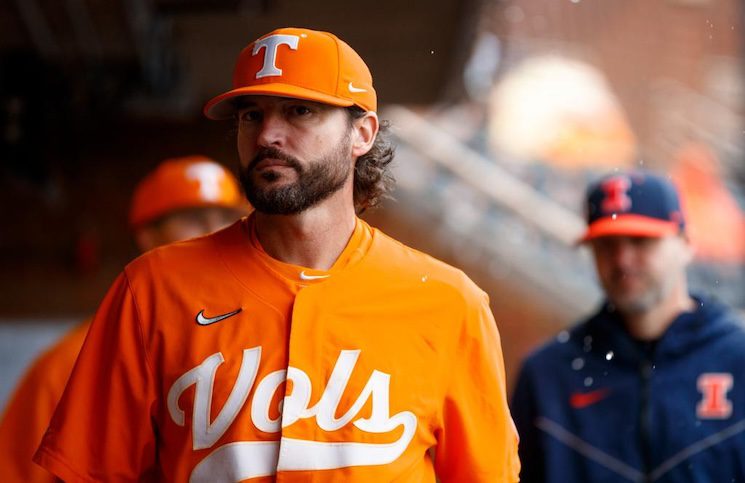
Tennessee heaped praise on DeBord in its official release announcing the hiring on Friday morning, quoting the likes of Tom Brady, Brian Griese, Mike Holmgren and Adam Gase, all of whom raved about DeBord’s background. Jones himself weighed in as well.
“Mike is a tireless worker and innovator with a proven track record of success as both an offensive coordinator and as a developer of quarterbacks at a high level,” Jones said. “He has demonstrated meticulous attention to the small details, and he is a great fit with our staff, players, and the entire Tennessee football organization.”
“I was very selective about the job opportunities presented, and I’m very excited to be a part of the building of something special here at Tennessee,” added DeBord. “The familiarity with the system, the staff, and Butch Jones will be a great asset as we build upon and enhance our offensive system at Tennessee.”
But all that won’t stop some from questioning the hire of a man who hasn’t coached at all since 2012, hasn’t been in the college game since 2007 and ended up 12-34 as the head coach at Central Michigan and then was part of the final Lloyd Carr staff that lost to Appalachian State in 2007 – a season that led to Carr’s retirement.
So with all that in mind, after extensive research, I’ve come up with a pro/con list. I’ve gone on record multiple times saying that I understand what Jones is thinking and believe that this could work out, though I’m also skeptical on some levels as well. Here are some of my lines of reasoning (some of my thoughts are changed/updated/expanded from my original profile after watching more Central Michigan film from 2000-03.)
Pros
• Familiarity/comfort level: I could almost stop the list right here. Jones trusts DeBord, end of statement. They worked together for four years at CMU after DeBord kept him on staff and then later elevated him to offensive coordinator. DeBord was the OC at CMU before Jones was, so they had a lot of interaction in running the offense together once Jones became the OC under him. Jones listed DeBord as an influence when he arrived at UT in 2012. At the end of the day, Jones knows DeBord, knows that he’s a good teacher and knows that he’ll run the offense that Jones has in place.
• DeBord checks the resume boxes: Jones laid out some parameters of what he was looking for (even though he likely already knew it would be DeBord a while back) and included experience calling plays and NFL experience as well. DeBord fits that criteria. He called plays for five years at Michigan (97-99; 06-07) winning a national title in that span and spent 2008-12 with the Seahawks and Bears in the NFL as an assistant coach. He’s been a head coach, has coached tight ends and the offensive line at major levels and has seen almost every aspect of football in his lengthy career.
• There’s some schematic fit: I’ve said multiple times that DeBord has never led a true spread offense that looks exactly like what Jones runs now. I stand by that, but as I watched some more Central Michigan film especially, I can see some elements of what Jones does now at Tennessee in what they were doing at CMU. There’s a fair amount of one-back sets, they actually ran a lot of no-huddle and there’s some West Coast Offense philosophy in there as well. Jones basically took a lot of his offensive philosophy from DeBord and expanded on it after time with Brian Kelly and Rich Rodriguez. DeBord also switched to a zone blocking scheme later in his career, something the Vols utilize a lot of. So while I don’t think it’s accurate to say that “it’s the same offense,” there are a lot of the same elements in it.
• DeBord can help bring some power to the run game: As stated, this offense won’t change at Tennessee. But I can see DeBord being allowed to make some tweaks, especially in the run game, where he has a lot of expertise. The Vols haven’t regularly been able to get it done on short-yardage situations. Personnel – particularly deficiencies on the offensive line – have played a large role in that, but with that unit set to be more experienced in 2015, perhaps DeBord and Mahoney can work together to get that group to the next level.
Cons
• He’s been out of the game: It’s no doubt unusual from that standpoint. Gene Chizik (North Carolina DC) is the only other person I can think of off the top of my head who has been out of coaching for multiple years to return to be a coordinator in major college football. I’m sure there are others, but it’s definitely not common. And even Chizik stayed involved in the game by being an analyst for much of that time. So while he and Jones trust each other and are on the same wavelength about a lot of elements, the game has clearly evolved in the last few years. I’m sure DeBord kept studying, but that’s different than being on the field coaching.
• Recruiting questions: This goes back to him being out of the game to an extent, especially being out of the college game since 2007. Recruiting has changed a ton since then with social media becoming a huge factor. If there’s one thing that almost nobody questions about Jones – it’s the recruiting that he and his staff do. They have plenty of other ace recruiters, and I’m not saying DeBord will be a huge liability in that area, but it seems that there are other candidates who would’ve raised the recruiting level more.
• Schematic questions: After watching more CMU film, as I said in the pros section, I see some of the similarities to what Jones runs now from that era they spent together. But it doesn’t look the exact same – they’re under center more and utilize a fullback more – and it also can’t be ignored that he spent a ton of time with Lloyd Carr at Michigan in a very traditional, I-formation-based offense. One national preview wrote of DeBord’s offense before the 2003 season: “In the Mike DeBord era, the running game has always been the staple of this offense. Despite the one-back look often used, they are most effective when lining up in the “I” and running it right at a defense.” At the end of the day, a good percentage of the offenses that DeBord has called during his career as a play caller didn’t look like what is seen at Tennessee now. There will be some adjusting to do to get exactly in sync with Jones.
• Recent results: I’ve seen some impressive numbers thrown around from DeBord’s history. Bruce Feldman noted that he’s 54-11 as a play-caller in his career. I can’t just ignore that, but if you break it down more recently, he was 12-34 as a head coach at CMU (with Jones calling plays for some of that time), he had a good year in 2006, helping Michigan to an 11-2 mark that ended a Rose Bowl loss, but then 2007 ended up being the year that Lloyd Carr retired after starting the season out with a loss to Appalachian State. The NFL teams he worked with from 2008-12 had a combined 38-42 record with just one playoff appearance as well.
• Lack of quarterbacks experience: DeBord, to the surprise of many, will also carry the title of quarterbacks coach, a role he hasn’t formally filled since 1986, at Fort Hays State. We expect graduate assistant Nick Sheridan to work with the quarterbacks a lot. Sheridan is more than a typical GA. He played QB under DeBord at Michigan and has been a QBs coach and passing game coordinator at South Florida and Western Kentucky. So while the tandem of DeBord and Sheridan could certainly do a good job, it’s asking a lot of two guys without a ton of formal QB coaching experience to take Joshua Dobbs to the next level and to develop three true freshman QBs as well.



